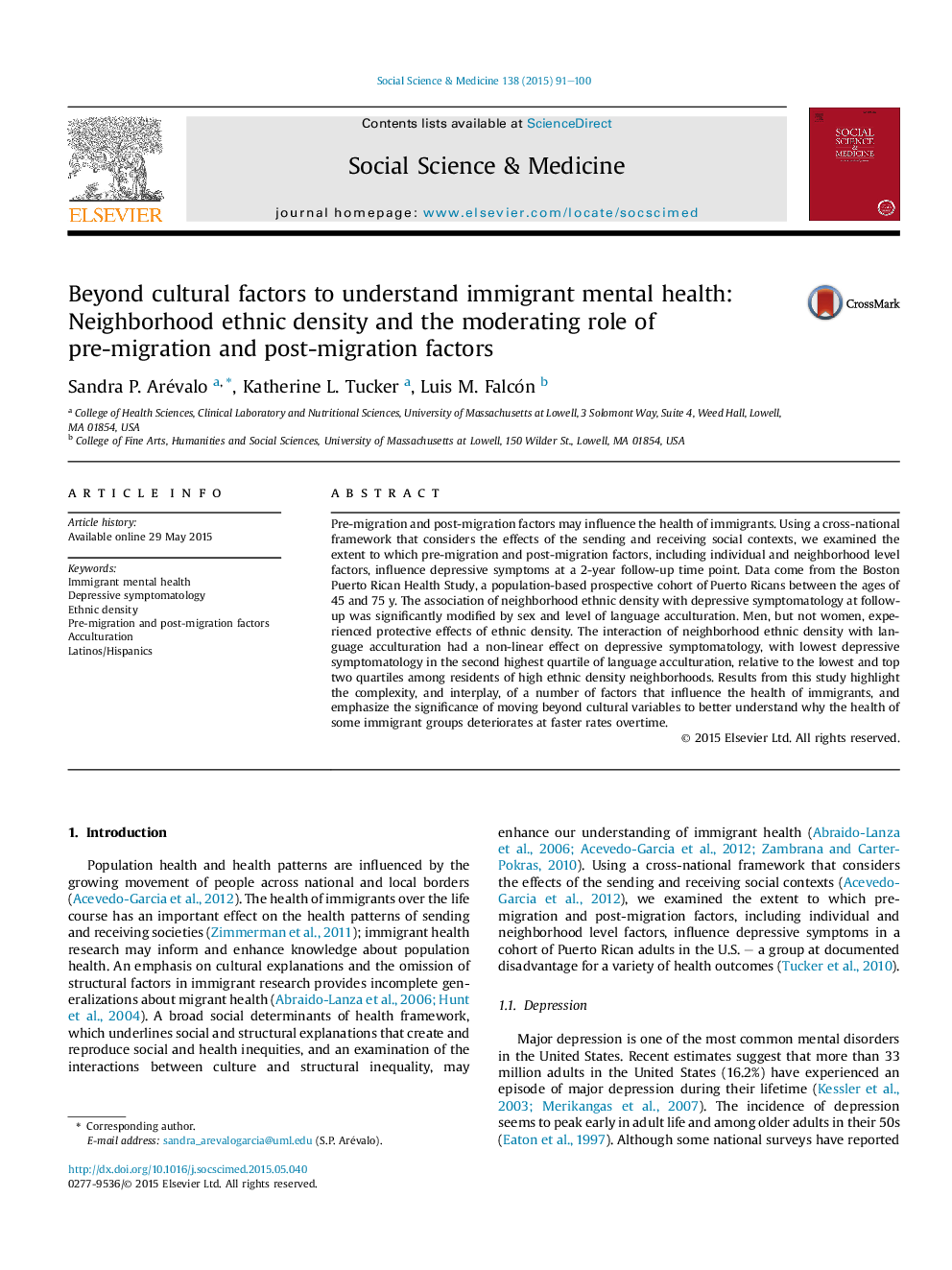| کد مقاله | کد نشریه | سال انتشار | مقاله انگلیسی | نسخه تمام متن |
|---|---|---|---|---|
| 7332117 | 1476031 | 2015 | 10 صفحه PDF | دانلود رایگان |
عنوان انگلیسی مقاله ISI
Beyond cultural factors to understand immigrant mental health: Neighborhood ethnic density and the moderating role of pre-migration and post-migration factors
ترجمه فارسی عنوان
فراتر از عوامل فرهنگی برای درک سلامت روانی مهاجران: تراکم قومی همجنسگرایان و نقش تعدیل کننده پیش مهاجرت و عوامل پس از مهاجرت
دانلود مقاله + سفارش ترجمه
دانلود مقاله ISI انگلیسی
رایگان برای ایرانیان
کلمات کلیدی
ترجمه چکیده
عوامل پیش مهاجرت و پس از مهاجرت ممکن است بر سلامت مهاجران تأثیر بگذارد. با استفاده از چهارچوب متقابل ملی که تاثیرات حوزه های اجتماعی ارسال و دریافت را در نظر می گیرد، ما بررسی می کنیم که آیا قبل از مهاجرت و عوامل پس از مهاجرت، از جمله عوامل فردی و همسایگی، نشانه های افسردگی را در 2 سال پیگیری، نقطه زمان بالا داده ها از مطالعات بهداشتی بوستون پورتوریکو، جمعیتی مبتنی بر پیش بینی گروه پورتو ریکن بین 45 تا 75 سال سن دارد. ارتباط بین تراکم قومی محله با علائم افسردگی در پیگیری به طور معنی داری با توجه به جنس و سطح تحصیلات زبان اصلاح شد. مردان، اما نه زنان، اثرات محافظتی تراکم قومی را تجربه کردند. تعامل تراکم قومی محله با تطبیق زبان اثر غیر خطی بر علائم افسردگی داشت، با کمترین علائم افسردگی در دومین بالاترین درجه تقلید زبان، نسبت به پایین ترین و بالاترین دو دسته در میان ساکنان محله های چالشی قومی بالا بود. نتایج این مطالعه نشان دهنده پیچیدگی و تعامل چندین عامل است که بر سلامت مهاجران تأثیر می گذارد و بر اهمیت حرکت فراتر از متغیرهای فرهنگی تاکید می کند تا به درک بهتر اینکه چرا برخی از گروه های مهاجر از نظر سرعتی با اضافه کاری مواجه می شوند.
موضوعات مرتبط
علوم پزشکی و سلامت
پزشکی و دندانپزشکی
سیاست های بهداشت و سلامت عمومی
چکیده انگلیسی
Pre-migration and post-migration factors may influence the health of immigrants. Using a cross-national framework that considers the effects of the sending and receiving social contexts, we examined the extent to which pre-migration and post-migration factors, including individual and neighborhood level factors, influence depressive symptoms at a 2-year follow-up time point. Data come from the Boston Puerto Rican Health Study, a population-based prospective cohort of Puerto Ricans between the ages of 45 and 75Â y. The association of neighborhood ethnic density with depressive symptomatology at follow-up was significantly modified by sex and level of language acculturation. Men, but not women, experienced protective effects of ethnic density. The interaction of neighborhood ethnic density with language acculturation had a non-linear effect on depressive symptomatology, with lowest depressive symptomatology in the second highest quartile of language acculturation, relative to the lowest and top two quartiles among residents of high ethnic density neighborhoods. Results from this study highlight the complexity, and interplay, of a number of factors that influence the health of immigrants, and emphasize the significance of moving beyond cultural variables to better understand why the health of some immigrant groups deteriorates at faster rates overtime.
ناشر
Database: Elsevier - ScienceDirect (ساینس دایرکت)
Journal: Social Science & Medicine - Volume 138, August 2015, Pages 91-100
Journal: Social Science & Medicine - Volume 138, August 2015, Pages 91-100
نویسندگان
Sandra P. Arévalo, Katherine L. Tucker, Luis M. Falcón,
